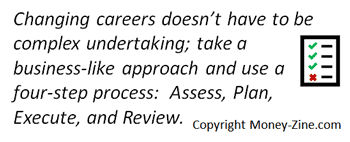The requisite warning needs to be given to anyone looking to change careers: The grass is not always greener on the other side. With that out of the way, we're ready to provide some advice on how to go about changing careers. One of the most important quality of life factors is an enjoyable career. Anyone looking to make a switch certainly doesn't want to wind up in a situation that's unbearable. In fact, the ideal career is one that will be enjoyed so much you'll want to stay in that job for many years to come. This should be the frame of mind when planning a change.
| Additional Resources |
| High Paying Careers Top Employee BenefitsAsking for a Raise Asking for a Promotion Career Management |
Depending on personal beliefs, someone might want to go through several career changes throughout their life. If you're looking to switch jobs every two years, the advice that follows is not for you. That's really just job hopping, which is a completely different topic.
Planning a Career Change
Planning advice is oftentimes described in as little as five simple steps, or as complex as a full-blown 15 step process. Fortunately, the process doesn't have to be complex. Let's take a business-like approach and use a well-known four step process: Assess, Plan, Execute, and Review.
Career Assessment
A career assessment should be the first step in any plan. A career assessment consists of identifying the likes and dislikes in a job. For example, you need to think through questions such as:
What do you really like doing at work?
Which work assignments do you dread?
What assignments were considered "fun" (if that is possible at work)?
Was it more enjoyable to work in teams or independently?

Make a list if necessary, but the key point here is to identify the kinds of jobs that you like and dislike. When thinking through these questions, keep asking the "why" question.
Why did you like the work?
Why was working on a team rewarding?
Why do you like interacting with others? (Perhaps you're an extrovert)
During the career assessment stage, look for an understanding of how your skills line up with these ideal jobs. Do you need more training or experience in a certain skill? Are you missing a key requirement of the ideal career?
Planning
The next step involves career planning. In this step, you want to map out a course of action. We've talked about this concept in more depth in our article: Career Planning. You've already identified likes, dislikes, and gaps in the previous step. Now is the time to create a plan to close any of those gaps. This could be through training, formal education, networking, or even volunteer work. You also need to start to put a job hunting plan together. If the future includes a career change, then a clear plan of action is required to make it happen. If not, then it will never get off the ground. To summarize, a career plan consists of two components:
Job Skills Planning: ensuring you're qualified for the pending career move.
Job Search Planning: an outline of how to go about finding a job.
Execute the Plan
The third step is to execute against the plan. You took the time to make one, now it's time to carry out that plan. That means it's time to start a training class or start a new job search. We've published an article explaining job search networking, and we have a lot more career development resources to help everyone get started. The bottom line is you need to start calling all those past contacts, and see if they can help out. Don't be afraid to ask; the worst someone can say is "I'm sorry." We're also going to talk later on about a good resume format to use when going through a career change. That will help you maximize the chances of getting a job interview.
Review the Plan
Once you've started the self-marketing campaign, and begin to see results, or lack of them, it's a good time to step back and review the plan to see what's working and what's not working. You'll want to review the career plan about a month after deploying it. If you are not getting a good response, then it's time to revisit the plan. This is a mistake some people often make; they continue to stick with a defective plan. While response to a resume is often a function of the job market, make sure the plan is not flawed. Take a break from charging ahead and step back and take a look at the bigger picture. Look at everything that's happened, and try to remain objective about the opportunity to change careers right now. Are you going to find the right job any day now? Or have you gone weeks without any response to the resume?
Resumes for Career Changes
That last question brings up our final topic: resumes for career changes. There are three common formats in use today: chronological, functional, and combination style resumes. The combination and chronological resume styles list prior work experience in reverse chronological order. Because of the emphasis on historical jobs, these kinds of resumes are usually not the best style for career changers. The functional format emphasizes the skills obtained in the past, not necessarily job progression. Take a look at the functional resume example, and see how it emphasizes skills and knowledge. The functional resume is typically the most appropriate format to use when thinking about changing careers.
About the Author - Changing Careers



.jpg)